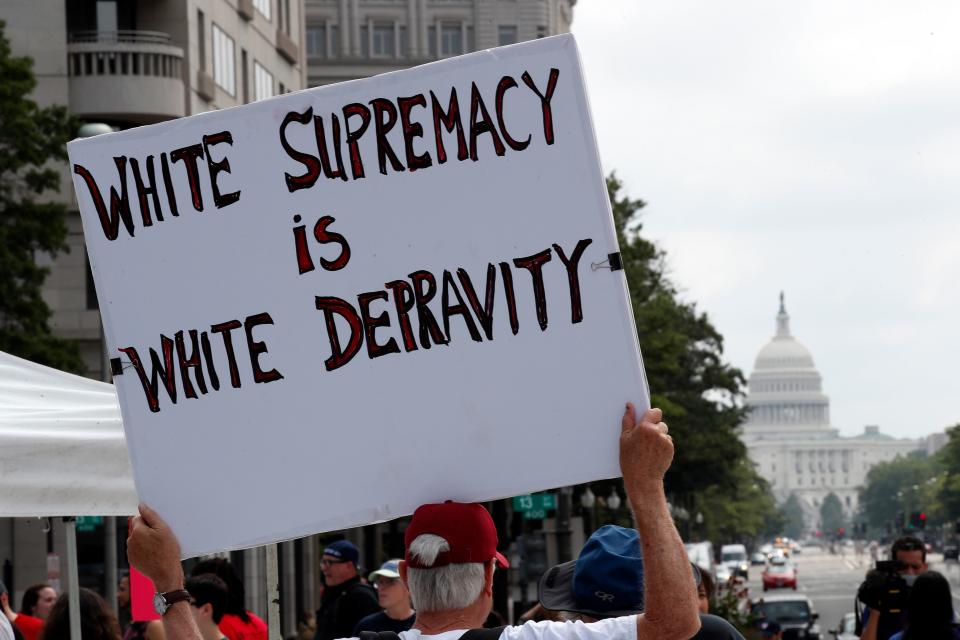Charlottesville sends message to hearts of Americans from heart of old Confederacy | Opinion
The 2017 violence that erupted in Charlottesville, Virginia, has, for the past four years, made the city shorthand for white supremacist hatred and violence. Tuesday, a Charlottesville jury delivered a resounding rebuke to the purveyors of violent racism. It was a welcome message to the hearts and minds of Americans from the heart of the old Confederacy.
The images surrounding that "Unite the Right" rally are hard to forget: the torchlight march across the University of Virginia campus evoking the terror unleashed on Black Americans and their white allies since shortly after the Civil War; worshippers told to slip out the back door of a synagogue to avoid gun-toting protesters chanting Nazi slogans; James Fields driving into a crowd, killing Heather Heyer and leaving others with horrible injuries.

In the era of social media and 24-hour news, such images circulate endlessly. They can fuel a kind of despair that America is a hopelessly divided nation where civil rights are forever imperiled and racist hatred is on the rise. It is true that bigotry is stubborn and racism is systemic. We are still fighting to protect voting rights. But that is not the whole story.
BEN CRUMP: Black pastors helped guide this nation's moral conscience. Don't keep them out of court.
The decision reached by the jury in the federal courthouse in Charlottesville to award more than $25 million to the plaintiffs tells us something else. The multimillion dollar verdicts against individuals and groups responsible for organizing the rally are testament to an evolving American consensus against hate, a reflection of our desire to move beyond a century-and-a-half of white supremacist terror.
Thomas Jefferson is the Founding Father most associated with Charlottesville. He was a man of deep contradictions. He was a slave owner who wrote about equality and liberty. He did not free most of the enslaved people who worked for him, even in his death, but he anticipated and advocated for the eventual end of slavery. He could not unshackle himself from his personal dependence on the institution of slavery, but he provided us all with liberationist language that future visionaries would use to unshackle Americans from the violent ideology of white supremacy.
Some have expressed confusion and disappointment that the jury did not reach a verdict on claims that were brought under an anti-KKK law that the defendants had conspired to commit racist violence. We do not know why this was the case. Some have suggested it could have been the more complex jury instructions for the federal law. It could have reflected a compromise among jurors.
What we do know, and what is heartening, is that the jurors awarded millions in compensatory and punitive damages to victims of Unite the Right violence under a Virginia conspiracy law.
Jefferson and other Founders were deeply committed to the importance of trial by jury. In his first inaugural address, Jefferson listed “equal and exact justice to all men” and “trial by juries impartially selected” alongside freedom of religion and freedom of the press as “essential principles of our government” and “the creed of our political faith.”
The Charlottesville jurors’ verdict was a clear rebuke of the groups and individuals who had been sued, described by New York Times reporter Neil MacFarquhar as "a mix of white nationalists, neo-Nazis and Confederate sympathizers." In that same report, Roberta Kaplan, the lead attorney for the people who brought the lawsuit, called the verdict a message that "this country does not tolerate violence based on racial and religious hatred in any form."
Let us thank the plaintiffs, lawyers and members of the jury for sending that message. And let us all commit to making it ever more true.
Ben Jealous is president of People For the American Way and a visiting scholar at the University of Pennsylvania. He is a direct descendant of two Black Reconstruction-era members of the Virginia House of Delegates as well as Thomas Jefferson’s grandmother.
This article originally appeared on USA TODAY: Charlottesville shows US rebuke of white supremacist hatred | Opinion

